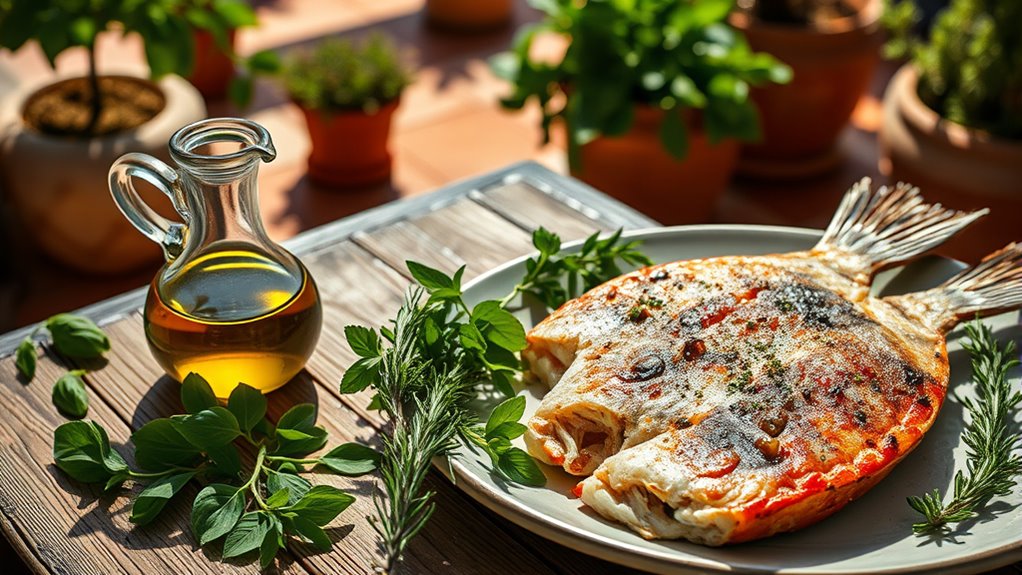To embrace the Mediterranean diet, focus on using plenty of olive oil for flavor and health benefits, incorporating fresh seafood like fish prepared simply through grilling, baking, or steaming, and adding aromatic herbs such as basil, oregano, and rosemary to boost taste and nutrition. These ingredients create delicious, nutrient-rich meals that support overall well-being. Keep exploring these essentials, and you’ll discover how they can transform your everyday eating into something both enjoyable and nourishing.
Key Takeaways
- Olive oil is a primary source of healthy monounsaturated fats, antioxidants, and anti-inflammatory compounds in the Mediterranean diet.
- Incorporating seafood like fish provides essential omega-3 fatty acids, promoting heart and brain health.
- Fresh herbs such as basil, oregano, thyme, rosemary, and parsley enhance flavor and add antioxidants without extra calories.
- Combining olive oil, seafood, and herbs creates nutritious, flavorful meals that support overall well-being.
- The Mediterranean diet emphasizes quality ingredients and mindful preparation to make healthy eating enjoyable and sustainable.

Have you ever wondered how the Mediterranean diet promotes both health and enjoyment? It’s not just about what you eat, but how you prepare and savor your meals. Central to this lifestyle are ingredients like olive oil, seafood, and herbs that work together to create flavor-packed, nutritious dishes. Olive oil benefits are well-documented, making it the cornerstone of this diet. Unlike processed fats, extra virgin olive oil is rich in monounsaturated fats, antioxidants, and anti-inflammatory compounds. Using it liberally in your cooking or as a finishing touch can improve your heart health, support weight management, and boost overall well-being. Its smooth, robust flavor elevates salads, vegetables, and even grains, making every bite more satisfying.
Olive oil enhances flavor and supports heart health in the Mediterranean diet.
When it comes to seafood preparation, the Mediterranean approach emphasizes simplicity and freshness. Fish and shellfish are lean, nutrient-dense, and versatile, perfect for quick, healthful meals. You might grill a fillet with a drizzle of olive oil and a squeeze of lemon, or bake seafood with herbs and garlic for added flavor. The key is avoiding heavy sauces or frying, which can diminish the health benefits. Instead, focus on methods like grilling, poaching, or roasting — these techniques preserve the delicate flavors of the seafood without adding unnecessary calories or fats. Seafood provides essential omega-3 fatty acids, which support heart and brain health, reduce inflammation, and promote better mood. Incorporating seafood into your diet a couple of times a week can make a significant impact on your overall health.
Herbs are another essential element, enhancing dishes with vibrant flavors without extra salt or calories. Basil, oregano, thyme, rosemary, and parsley are staples that add aroma and depth to your meals. Fresh herbs can transform simple ingredients into restaurant-quality dishes, making your eating experience more enjoyable and satisfying. They also contain antioxidants and anti-inflammatory properties, contributing further to your health. Combining herbs with olive oil and seafood creates harmonious, flavorful dishes that are both nourishing and delightful. This trio of ingredients encourages you to cook in a way that’s both healthful and pleasurable, turning everyday meals into flavorful, nutrient-rich experiences.
In essence, the Mediterranean diet’s success lies in its emphasis on quality ingredients like olive oil, seafood, and herbs, and in the way you prepare and enjoy your food. By focusing on these elements, you not only nourish your body but also make mealtimes a pleasurable ritual. This approach proves that eating well doesn’t mean sacrificing taste or enjoyment — it’s about making mindful, flavorful choices that benefit your health in the long run.
Frequently Asked Questions
How Does Olive Oil Compare to Other Cooking Oils Nutritionally?
Olive oil benefits include being rich in monounsaturated fats, which support heart health and reduce inflammation. Compared to other cooking oils, it has a higher antioxidant content and fewer unhealthy fats. When you do a cooking oil comparison, you’ll find olive oil stands out for its health benefits, especially extra virgin varieties, making it a smarter choice for daily use. Its flavor also enhances dishes naturally.
What Are the Best Types of Fish for the Mediterranean Diet?
Like Odysseus choosing his path, you should pick the best fish for your Mediterranean diet. Opt for sustainably caught salmon, sardines, and mackerel, which are rich in Omega-3 benefits. These choices support healthy heart and brain function while promoting eco-friendly fishing practices. Incorporating these fish into your meals not only elevates flavor but also aligns with the diet’s focus on wholesome, sustainable eating.
Can Herbs Be Used to Replace Salt for Flavor?
Yes, herb flavorings can effectively replace salt for flavor and serve as a salt substitution. You can use herbs like basil, oregano, thyme, and rosemary to enhance your dishes naturally. These herbs add depth and aroma, reducing your need for salt while boosting flavor. Experiment with different combinations to find what you enjoy most. Using herb flavorings not only makes your meals healthier but also more vibrant and flavorful.
Are There Vegetarian or Vegan Options Within Mediterranean Diet Herbs?
Yes, you can find vegetarian or vegan options within Mediterranean diet herbs. Herb flavoring offers a plant-based way to enhance your dishes without relying on animal products. Fresh herbs like basil, parsley, oregano, and thyme add vibrant flavor, making them perfect for vegetarian or vegan meals. Incorporate these herbs generously to boost taste, reduce salt, and enjoy the Mediterranean diet’s healthy, plant-based approach.
How Does the Mediterranean Diet Impact Long-Term Heart Health?
Imagine your heart as a thriving garden, nurtured by healthy choices. Following the Mediterranean diet helps lower your risk of heart disease by improving cardiovascular health. It emphasizes nutrient-rich foods like olive oil, fish, and herbs, which reduce inflammation and cholesterol levels. Over time, these habits strengthen your heart, making it more resilient. Embracing this diet can lead to a healthier, longer life, keeping your heart garden flourishing.
Conclusion
Embracing the Mediterranean diet means nourishing your body with wholesome olive oil, fish, and herbs. These simple yet powerful ingredients can transform your health and flavor your meals with richness. Remember, “You are what you eat,” so choose wisely and enjoy every bite. Incorporate these essentials into your daily routine, and you’ll not only enjoy delicious food but also boost your well-being for years to come. Start today—your future self will thank you.









